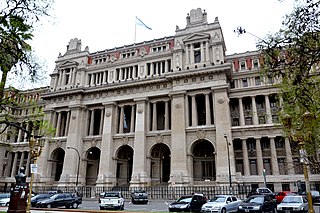
The Supreme Court of Ireland is the highest judicial authority in Ireland. It is a court of final appeal and exercises, in conjunction with the Court of Appeal and the High Court, judicial review over Acts of the Oireachtas. The Supreme Court also has appellate jurisdiction to ensure compliance with the Constitution of Ireland by governmental bodies and private citizens. It sits in the Four Courts in Dublin.

The Political Constitution of Colombia of 1991, is the Constitution of the Republic of Colombia. It was promulgated in Constitutional Gazette number 114 on Thursday, July 4, 1991, and is also known as the Constitution of Human Rights. It replaced the Political Constitution of 1886 and was issued during the presidency of the liberal César Gaviria, with ideas from the also liberal Luis Carlos Galán.

The Supreme Court of Justice of the Nation (Spanish: Suprema Corte de Justicia de la Nación is the Mexican institution serving as the country's federal high court and the spearhead organisation for the judiciary of the Mexican Federal Government. It consists of eleven magistrates, known as ministers of the court, one of whom is designated the court's president.

The Supreme Court of Argentina, officially known as the Supreme Court of Justice of the Argentine Nation, is the highest court of law of the Argentine Republic. It was inaugurated on 15 January 1863. However, during much of the 20th century, the Court and the Argentine judicial system in general, lacked autonomy from the executive power. The Court was reformed in 2003 by the decree 222/03.

Ricardo Luis Lorenzetti is an Argentine judge graduated from the National University of the Littoral, Argentina, with a long national and international career. He used to be Chief Justice of the Supreme Court of Argentina (2007-2018), proposed by President Néstor Kirchner and approved by the Senate, assuming his position on December 12, 2004, covering the vacancy caused by the resignation of Justice Adolfo Vázquez. On November 7, 2006, he was appointed Chief Justice, officiated as of January 1, 2007. Currently, he is one of the five Justices of the Supreme Court. He was President of the Commission for the preparation of the Parliamentary Act to reform, update and unify the Civil and Commercial Codes of the Argentine Nation, Presidential Decree 191/2011.

The Supreme Court of Justice of Colombia in Bogotá is the highest judicial body in civil and penal matters and issues of criminal and civil procedure in Colombia. The Supreme Court of Colombia is the highest authority in regard to the interpretation of administrative law, constitutional law, and the administration of the judiciary.
The Supreme Court of Bolivia was the Bolivia's highest court from 1825 to 2012. It was located in Sucre, 410 kilometres to the south-east of La Paz, Bolivia's capital. The Court was created by the Supreme Decree of April 27, 1825, which transformed the Royal Audience of Charcas of imperial Spain into the Supreme Court of the newly independent country. The Supreme Court of Bolivia was officially inaugurated on July 16, 1827.

Juan Nepomuceno Silva Meza, son of the writer Juan Silva Vega and professor Ana María Meza de Silva, is a Mexican jurist. He served as an Associate Justice (ministro) of the Supreme Court of Justice of the Nation since 26 January 1995, having previously served extensively elsewhere in the judiciary, including the Federal Electoral Tribunal. On 3 January 2011, he was elected Chief Justice for a term that ended on 31 December 2014.

The Supreme Court of Costa Rica is the court of greater hierarchy of Law and Justice in Costa Rica.

The Supreme Court of Justice of El Salvador is the highest court of El Salvador. The court sits in San Salvador. The current president is Judge José Belarmino Jaime, who has held the position for three consecutive terms.

The Supreme Court of Honduras is the Supreme Court and Constitutional Court of Honduras. The Supreme Court is the highest judicial authority in Honduras.

The Supreme Court of Uruguay is the highest court of law and last resort in the Oriental Republic of Uruguay. It serves as the highest appeals court, and appoints and oversees all other judges. Established on 28 October 1907, it is housed in the Palacio Piria, a masterpiece of eclectic architecture from 1917.

The Supreme Court of the Dominican Republic is the highest court existing in the Republic and is, therefore, the head of the judiciary in the country.
Augusto Ibáñez Guzmán was a Colombian lawyer and academic. He was the President of the Supreme Court of Justice of Colombia from 2009–2012.
José Luis Barceló Camacho is a Colombian lawyer and academic, former president of the Supreme Court of Justice of Colombia.
Corte Suprema de Justicia, Spanish for Supreme Court of Justice, may refer to:
Silvia Patricia Valdés Quezada is a lawyer who is serving as the third female president of the Supreme Court of Justice and the judicial branch of Guatemala.
Doris Perla Morales Martínez is a Uruguayan lawyer who serves as a minister of the Supreme Court of Uruguay.













